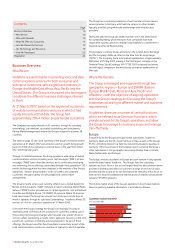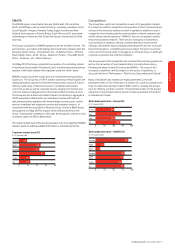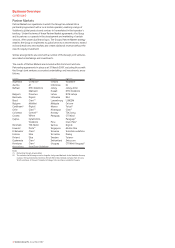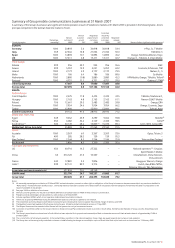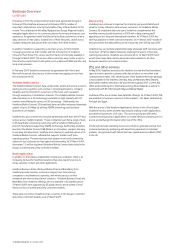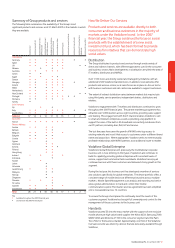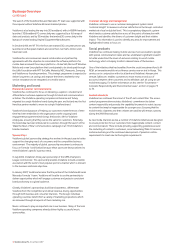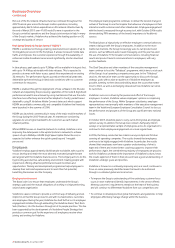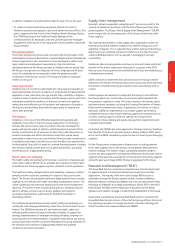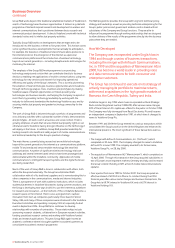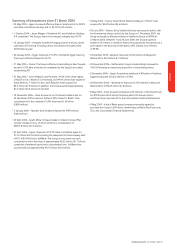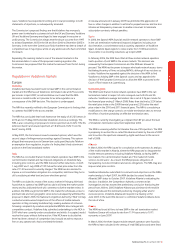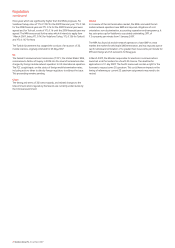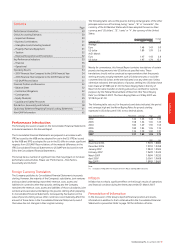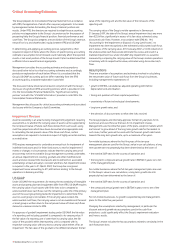Vodafone 2007 Annual Report Download - page 22
Download and view the complete annual report
Please find page 22 of the 2007 Vodafone annual report below. You can navigate through the pages in the report by either clicking on the pages listed below, or by using the keyword search tool below to find specific information within the annual report.20 Vodafone Group Plc Annual Report 2007
Business Overview
continued
Roll out of the 3G network infrastructure has continued throughout the
2007 financial year across the Group’s mobile operations, including
approximately £625 million expenditure on 3G network infrastructure. By
the end of March 2007, over 41,000 node B’s were in operation in the
Group’s controlled operations and the Group’s joint venture in Italy. In many
of the Group’s markets, Vodafone has achieved the leading position on 3G
coverage and quality of service.
High Speed Downlink Packet Access (“HSDPA”)
HSDPA is a wireless technology enabling data transmission speeds of up to
3.6 megabits per second in the first phase. It allows increased mobile data
traffic, and improves the customer experience through the availability of
enhanced mobile broadband services and significantly shorter download
times.
In later phases, peak speeds up to 7.2Mbps will be available in hotspots first,
with up to 14.4 Mbps achievable with later releases. This is expected to
provide customers with faster access speeds than experienced on existing
3G networks. The performance figures quoted are theoretical peak rates
deliverable by the technology in ideal radio conditions with no customer
contention for resources.
HSDPA is enabled through the deployment of new software in the 3G radio
network and expanding the processing capabilities of the node B. Significant
performance benefits are achieved by using mechanisms that use the radio
interface more effectively and are further adapted to ‘bursty’ packet based
data traffic using IP. Vodafone Mobile Connect data cards which support
HSDPA are available commercially, and compatible Vodafone live! handsets
were launched in the summer of 2006.
HSDPA was launched commercially in many of the major mobile markets of
the Group during the 2007 financial year. All markets are considering
upgrades to serve higher bandwidths for customers as each market
situation justifies.
While HSDPA focuses on downlink (network to mobile), Vodafone is also
improving the data speeds in the uplink (mobile to network) to achieve
speeds of up to 384kbps. HSUPA (High Speed Uplink Packet Access) is
expected to further enhance the uplink speed beyond 1 megabit
per second.
Employees
Vodafone employs approximately 66,000 people worldwide, with a goal to
recruit, develop and retain the most talented, motivated people that are
well aligned with the Vodafone brand essence. The Company aims to do this
by providing a productive, safe working environment, treating people with
respect and offering attractive performance based incentives and
opportunities. Training and development programmes help employees to
develop their skills and experience and to reach their full potential,
benefiting themselves and the Company.
Employee involvement
The Board’s aim is to ensure that employees understand the Group’s
strategic goals and the mutual obligations of working in a high performing,
values-based organisation.
Vodafone’s values continue to provide a common way of behaving and are
implicit in all that the Group does for and with its shareholders, customers
and employees. During the year, Vodafone has built further on its employee
engagement initiative through embedding the Vodafone brand, ‘Red, Rock
Solid, Restless,’ into the business through all of its people practices. This has
been supported by the development of a Vodafone People Strategy that
provides a common goal for the experience all employees receive when
joining and working for Vodafone.
The employer brand programme continues to deliver the desired change in
culture of the Group to one that inspires the behaviour of employees in their
interactions with customers and other stakeholders. Employee engagement
with the brand is measured through a survey tool, with October 2006 results
demonstrating 79% awareness of the brand’s importance to Vodafone’s
success.
The Board places a high priority on effective employee communications to
create a dialogue with the Group’s employees. In addition to the more
traditional channels, the Group increasingly uses its own products and
services, such as SMS and audio based messaging, and this year has seen
the use of Vodafone TV for broader communications, including financial
results and product launch communications to employees, with very
positive feedback.
The Chief Executive and other members of the executive management
team continue to host the “Talkabout” programme, which aims to visit each
of the Group’s local operating companies every year. In the “Talkabout”
sessions, the executive team use the opportunity to discuss the Group’s
strategic goals with as wide an audience of Vodafone employees as
possible, listening to their views and talking about the issues that matter
most to them, as well as exchanging ideas about how Vodafone can serve
its customers.
Vodafone’s success is driven by the passion and effort of the Group’s
employees. In return, Vodafone values employees’ opinions on improving
the performance of the Group. Within European subsidiaries, employee
representatives meet annually with members of the executive management
team in the Vodafone European Employee Consultative Council to discuss
the performance and prospects of the Group and significant trans-national
issues.
In October 2007, Vodafone plans to carry out its third global all employee
opinion survey. In addition, the Group now conducts half yearly interim
surveys on a representative sample of employees across its organisation to
continue to track employee engagement on a more regular basis.
In 2006, the Group conducted two interim surveys in April and October
covering all operating companies. The results showed that employees
continue to be highly engaged with Vodafone. In particular, the results
showed that employees now have a greater understanding of what is
expected of them and receive better coaching support to improve their
performance. Again, the overwhelming majority of employees are proud to
work for Vodafone, understand the importance of Vodafone’s values, know
the results expected of them in their jobs and have a good understanding of
Vodafone’s strategic goals and priorities.
Vodafone is focused on continually improving and, as a result, continues to
focus on some previously identified areas that need to be addressed
through co-ordinated global and local action:
•To improve the Group’s understanding of the underlying customer focus
issues in each market and identify improvements in the service offered.
Meeting customers’ requirements remains at the heart of the business
and will continue to differentiate Vodafone from our competition; and
•To continue to develop practical global frameworks and guidelines to help
employees effectively manage change within the business.


